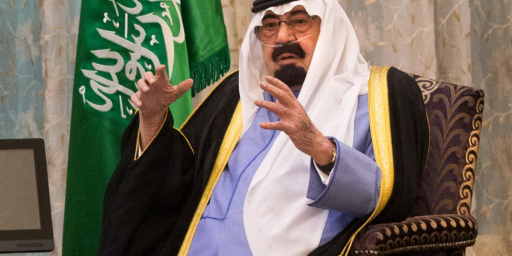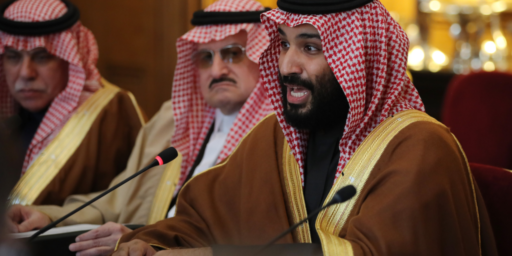Saudi Arabia’s King Fahd Dies at 84
Saudi Arabia’s King Fahd, long ill and only nominally “king” for years, is dead.
Saudi Arabia’s King Fahd Dies in Riyadh
Saudi Arabia’s King Fahd, who moved his country closer to the United States but ruled the world’s largest oil producing nation in name only since suffering a stroke in 1995, died early Monday, the Saudi royal court said. He was said to be 84.
Crown Prince Abdullah, the king’s 81-year-old half brother and the country’s de factor ruler, was appointed the new monarch. “With all sorrow and sadness, the royal court in the name of his highness Crown Prince Abdullah bin Abdul Aziz and all members of the family announces the death of the custodian of the two holy mosques, King Fahd bin Abdul Aziz,” according to a statement read on state-run Saudi TV by the country’s information minister.
Fahd died at approximately 2:30 a.m. EDT, a senior Saudi official in Washington told The Associated Press. President Bush was alerted within minutes of Fahd’s death, the official said on condition of anonymity. The king’s funeral was to be held Tuesday evening, he said. Saudi TV, which said the king was 84 years of age, broke into regular broadcasting to announce Fahd’s death. Quranic verse recitals followed the announcement by the minister, Iyad bin Amin Madani, whose voice wavered with emotion as he read the statement.
[…]
The Saudi statement said the new King Abdullah announced that his half brother and the Saudi defense minister, Prince Sultan bin Abdul Aziz, 77, would be the nation’s next crown prince.
During his rule, the portly, goateed Fahd, who rose to the throne in 1982, inadvertently helped fuel the rise of Islamic extremism by making multiple concessions to hard-liners, hoping to boost his Islamic credentials. But then he also brought the kingdom closer to the United States and agreed to a step that enraged many conservatives: the basing of U.S. troops on Saudi soil after the 1990 Iraqi invasion of Kuwait.
In his last years, Fahd was more of a figurehead than the actual ruler — so he was sidelined as the close relationship he nurtured with the United States deteriorated after the Sept. 11 attacks. Fifteen of the 19 hijackers were Saudis, and many in the U.S. administration blamed kingdom’s strict Wahabi school of Islam for fueling terrorism.
The “inadvertantly” is an interesting bit of commentary in an otherwise straight news story. By giving royal sanction, not to mention billions of dollars, to the Wahabi nuts to spread their pathology around the world, one can hardly imagine that something other than fueling their extremism would have resulted.






I think “inadvertently” is the proper word. It’s not like he set out to establish a group of terrorists that would threaten his own throne, after all….